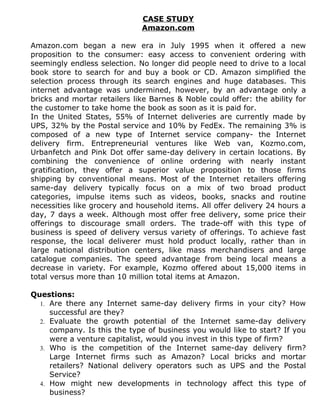
Amazon.Com
- 1. CASE STUDY Amazon.com Amazon.com began a new era in July 1995 when it offered a new proposition to the consumer: easy access to convenient ordering with seemingly endless selection. No longer did people need to drive to a local book store to search for and buy a book or CD. Amazon simplified the selection process through its search engines and huge databases. This internet advantage was undermined, however, by an advantage only a bricks and mortar retailers like Barnes & Noble could offer: the ability for the customer to take home the book as soon as it is paid for. In the United States, 55% of Internet deliveries are currently made by UPS, 32% by the Postal service and 10% by FedEx. The remaining 3% is composed of a new type of Internet service company- the Internet delivery firm. Entrepreneurial ventures like Web van, Kozmo.com, Urbanfetch and Pink Dot offer same-day delivery in certain locations. By combining the convenience of online ordering with nearly instant gratification, they offer a superior value proposition to those firms shipping by conventional means. Most of the Internet retailers offering same-day delivery typically focus on a mix of two broad product categories, impulse items such as videos, books, snacks and routine necessities like grocery and household items. All offer delivery 24 hours a day, 7 days a week. Although most offer free delivery, some price their offerings to discourage small orders. The trade-off with this type of business is speed of delivery versus variety of offerings. To achieve fast response, the local deliverer must hold product locally, rather than in large national distribution centers, like mass merchandisers and large catalogue companies. The speed advantage from being local means a decrease in variety. For example, Kozmo offered about 15,000 items in total versus more than 10 million total items at Amazon. Questions: 1. Are there any Internet same-day delivery firms in your city? How successful are they? 2. Evaluate the growth potential of the Internet same-day delivery company. Is this the type of business you would like to start? If you were a venture capitalist, would you invest in this type of firm? 3. Who is the competition of the Internet same-day delivery firm? Large Internet firms such as Amazon? Local bricks and mortar retailers? National delivery operators such as UPS and the Postal Service? 4. How might new developments in technology affect this type of business?
